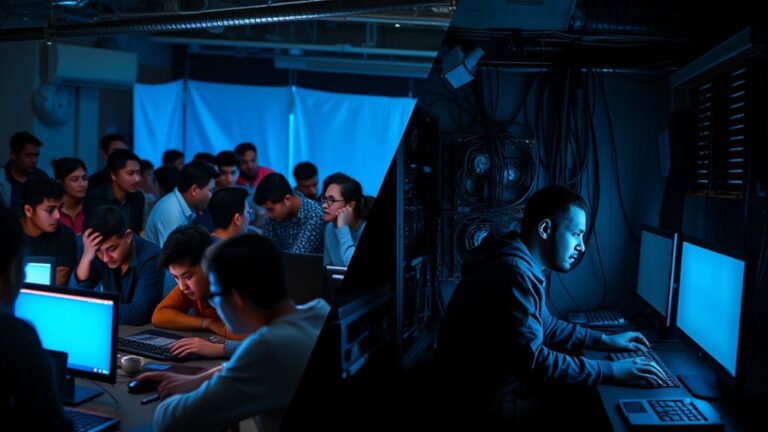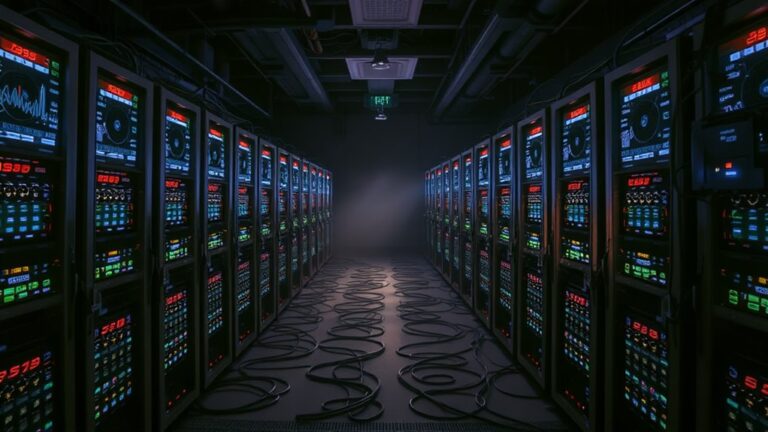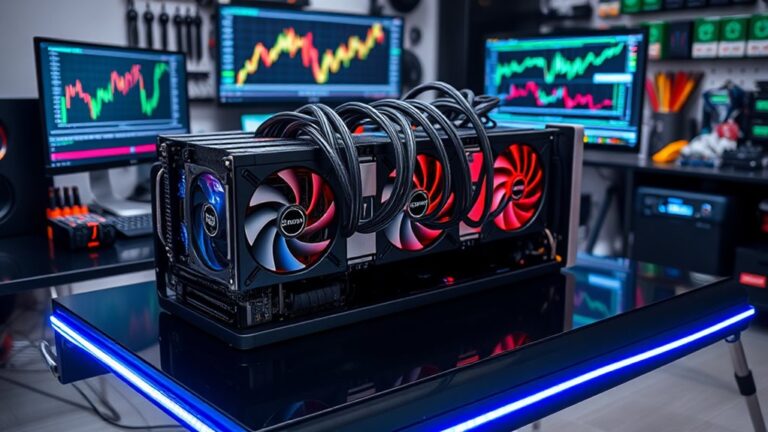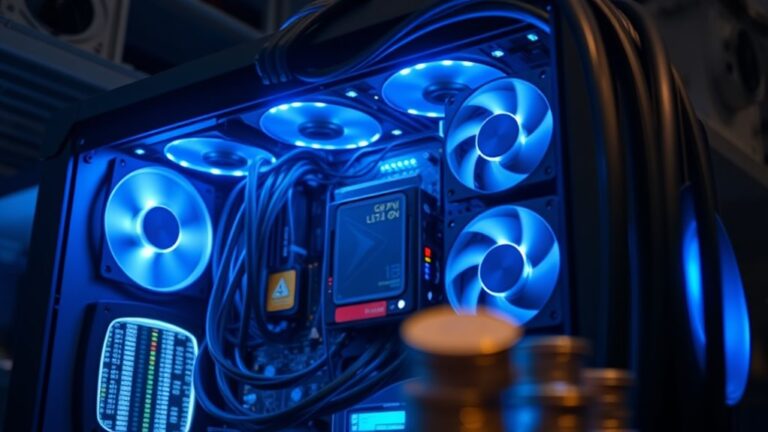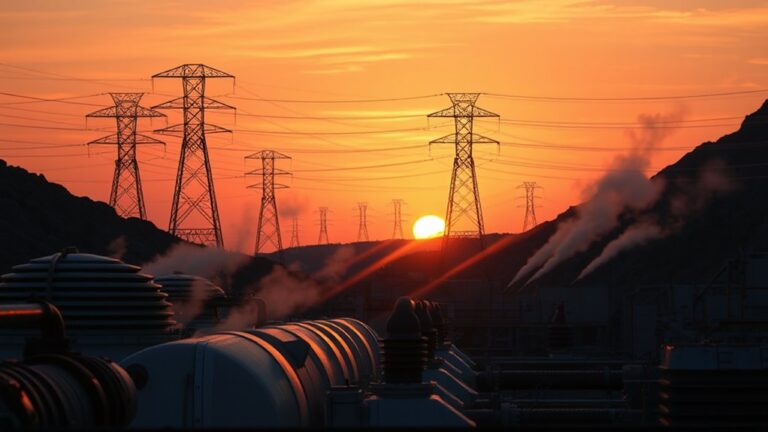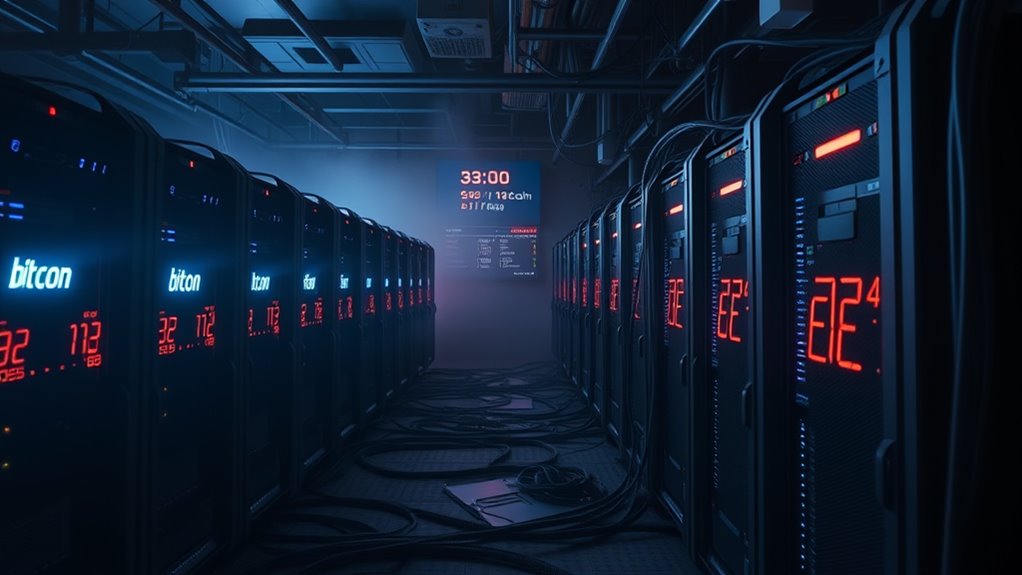
Bitcoin Mining Explained: How It Works & Its Importance
Bitcoin mining is the process that validates and records transactions on the Bitcoin network. It involves miners solving complex cryptographic puzzles using specialized hardware known as ASICs. As miners validate transactions, they collect fees and receive new Bitcoins as rewards, thereby contributing to network security and decentralization. Despite its economic benefits, mining faces challenges like high energy consumption and regulatory hurdles. Understanding these aspects is essential for grasping the full significance of Bitcoin mining in today’s economy.
Key Takeaways
- Bitcoin mining validates transactions and secures the blockchain through solving complex cryptographic puzzles, ensuring network integrity.
- Miners collect unconfirmed transactions, prioritize based on fees, and organize them into new blocks for verification and addition to the blockchain.
- The decentralized nature of mining prevents control by a single entity, enhancing security through distributed proof of work (PoW) consensus.
- Miners earn rewards in new Bitcoins and transaction fees, incentivizing their participation and contributing to local economies and job creation.
- Ongoing advancements in mining technology and energy sources reflect the industry’s commitment to sustainability and economic growth opportunities.
The Basics of Bitcoin Mining

Bitcoin mining serves as a fundamental process within the Bitcoin network, playing an essential role in validating and recording transactions. This process involves solving complex cryptographic puzzles, which secures the integrity of the blockchain.
By decentralizing mining activities, the network prevents any single entity from controlling it, enhancing security. Initially, miners used standard CPUs, but today’s mining requires specialized hardware like ASICs, which are more efficient and cost-effective.
Miners earn rewards in the form of new Bitcoins and transaction fees, motivating them to maintain network security. Key concepts include nonce, target hash, and hash rate, essential for understanding the mining process and ensuring all transactions are legitimate and accurately recorded. Additionally, the mining process ensures network integrity, as it validates transactions and introduces new currency into circulation, maintaining the stability of the blockchain.
The Mining Process: From Transactions to Blocks

The mining process is a critical component of the Bitcoin network, facilitating the shift from individual transactions to secure blocks on the blockchain.
It begins when a sender initiates a transaction to transfer Bitcoin to a recipient. This transaction is created, signed with the sender’s private key, and then broadcasted to the network. Nodes validate these transactions for authenticity before they enter the mempool, waiting to be included in a block.
Miners collect unconfirmed transactions, checking digital signatures and prioritizing those with higher fees. Selected transactions are organized into a new block, which is then hashed and solved through the Proof of Work process. This process involves miners competing to solve complex cryptographic puzzles, ensuring the network’s security and integrity through Proof of Work.
Once verified, the new block is added to the blockchain, confirming the transactions within it.
The Role of Mining in Bitcoin’s Security and Decentralization

While many individuals may focus on the potential profits of Bitcoin mining, its essential role in ensuring the security and decentralization of the network is equally significant.
Miners contribute to the integrity of the Bitcoin network through a proof of work (PoW) consensus, which involves rigorous computational tasks. The decentralized nature of miners enhances security and resilience against disruptions.
Key aspects of this role include:
- Decentralization: Miners spread globally, preventing any single point of failure.
- Incentives: Block rewards and transaction fees encourage miners to provide significant computational power.
- Network Security: A higher hash rate strengthens the network against attacks, ensuring secure transaction verification through SHA-256 cryptographic functions. Additionally, the shift toward renewable energy sources is helping miners reduce operational costs and improve profitability.
This combination of factors underpins Bitcoin’s operational stability and security.
Challenges and Considerations in Bitcoin Mining

As the Bitcoin network relies on miners to maintain its security and decentralization, various challenges and considerations emerge that impact the mining landscape. Regulatory environments differ across regions, with some states implementing strict laws and others promoting mining. Environmental concerns are significant, as mining consumes vast amounts of energy and contributes to greenhouse gas emissions. Technical challenges include the need for specialized hardware and high energy requirements. Additionally, community resistance arises due to noise and air quality issues. Furthermore, understanding the legal complexities surrounding mining regulations can help miners navigate these challenges more effectively.
| Challenge | Description | Impact |
|---|---|---|
| Regulatory Environment | Varying laws and federal oversight | Operational limitations |
| Environmental Impact | High energy consumption and emissions | Climate change concerns |
| Community Resistance | Local opposition due to noise and pollution | Increased scrutiny |
Economic Impact and Future Trends in Mining

Bitcoin mining plays a significant role in the economy, making substantial contributions to the United States’ gross product and employment landscape. The industry not only generates significant revenue but also fosters local development and energy stability.
Key economic impacts include:
- Job Creation: Bitcoin mining supports over 31,000 jobs nationwide, contributing to local economies.
- Investment Surge: Companies like MARA have invested nearly $2 billion in the U.S., signaling confidence in future growth.
- Grid Stability: Miners help stabilize energy grids by adjusting their power consumption during peak demand, promoting sustainable energy practices. Furthermore, as miners diversify into AI and high-performance computing, they are not only enhancing their revenue streams but also contributing to broader technological advancements.
As the sector evolves, it is poised to enhance both economic opportunities and energy sustainability, reflecting ongoing advancements in technology and community engagement.
Frequently Asked Questions
Can Anyone Participate in Bitcoin Mining?
Participation in Bitcoin mining is open to anyone, but it requires specialized hardware, software, and a stable internet connection. Economic factors, legal considerations, and energy costs greatly influence the feasibility and profitability of mining endeavors.
What Are Mining Pools, and How Do They Work?
In the world of mining pools, teamwork makes the dream work. These platforms unite miners to enhance their chances of earning rewards. By pooling resources, participants solve complex puzzles collectively, sharing profits based on contributions.
How Does Mining Affect Bitcoin Transaction Speed?
Mining considerably influences Bitcoin transaction speed by validating transactions and adding them to the blockchain. Increased competition among miners can expedite processing, although network congestion and transaction fees can complicate confirmation times during high-demand periods.
What Equipment Is Needed for Successful Mining?
Successful mining requires a balance of powerful equipment and efficient systems. ASICs deliver unmatched performance, while GPUs offer versatility. Additionally, cooling systems and real-time monitoring tools enhance operational efficiency, ensuring a profitable mining venture.
Is Bitcoin Mining Profitable for Individuals Today?
Determining Bitcoin mining’s profitability for individuals today hinges on various factors, including reduced block rewards, rising difficulty, initial costs, and market volatility. Technological advancements and alternative revenue streams may enhance individual success in this challenging environment.
Conclusion
To sum up, bitcoin mining operates like a digital treasure hunt, where miners compete to solve complex puzzles for rewards. This process secures the network and maintains decentralization, ensuring that no single entity holds too much power. However, the environmental impact and rising energy costs pose significant challenges. As the world watches this spectacle, one might wonder if mining is truly a modern marvel or simply a high-tech form of digging for gold in the digital age.




